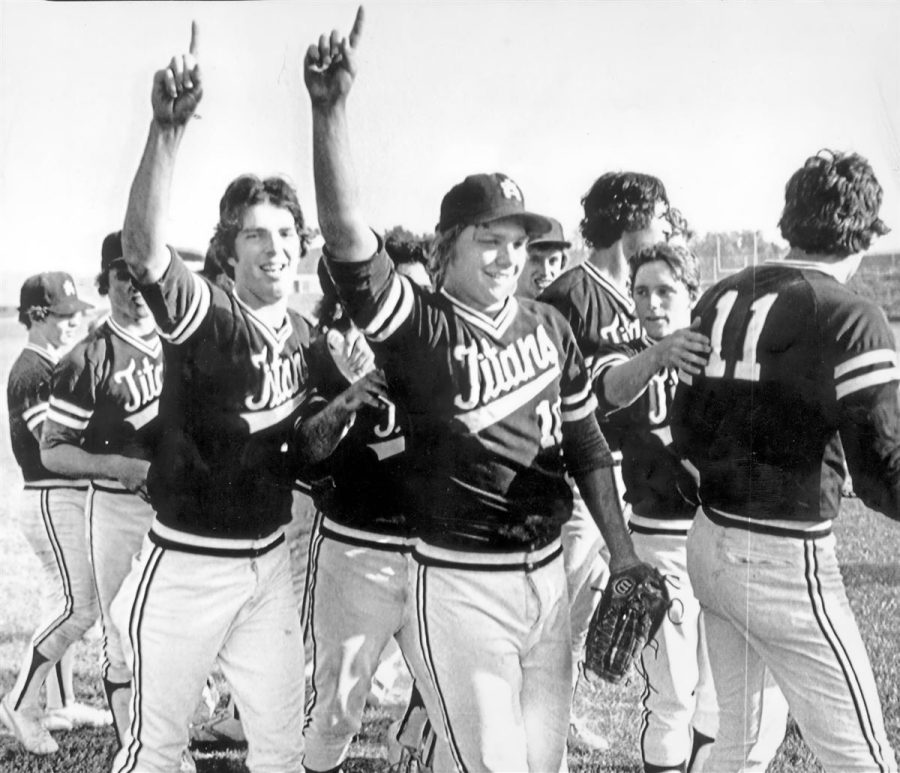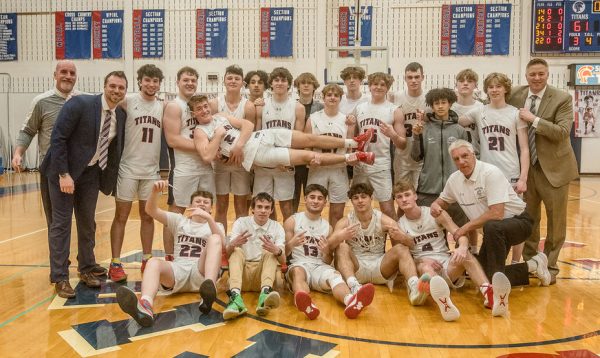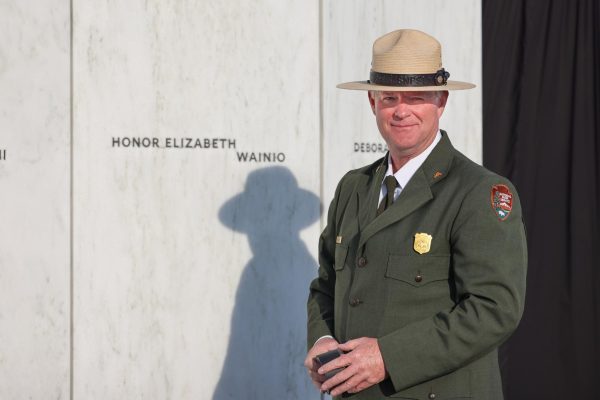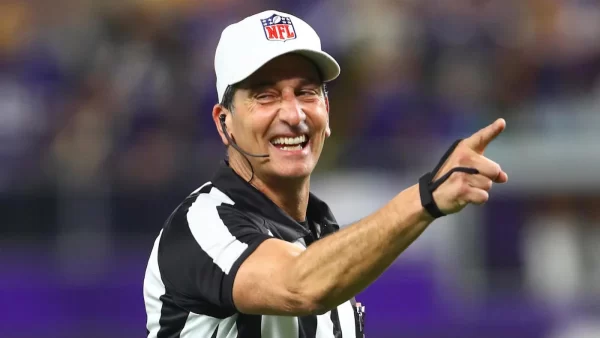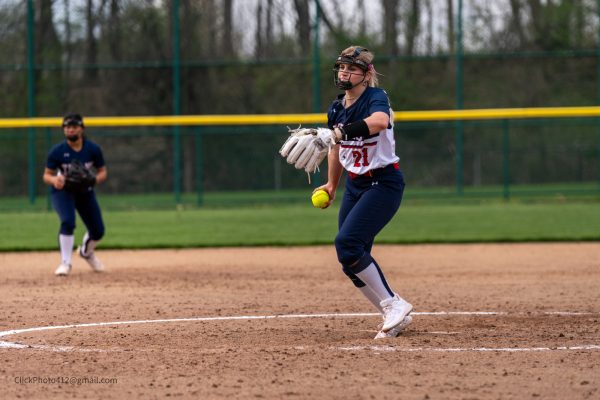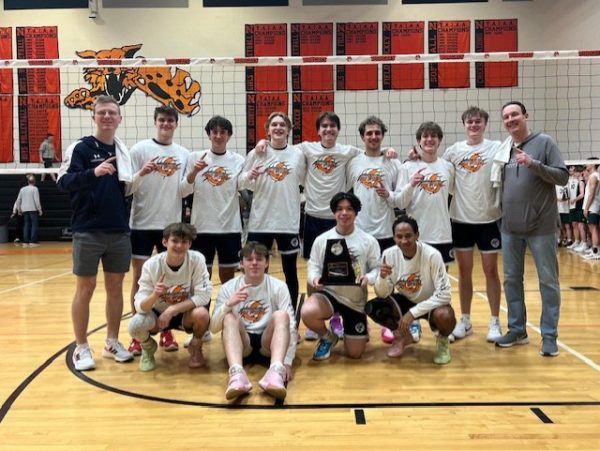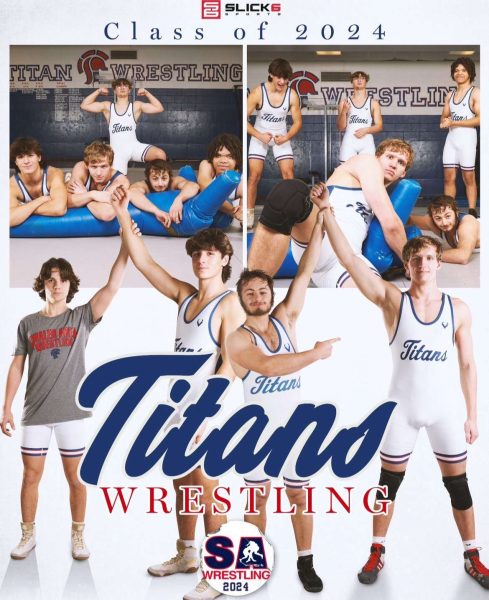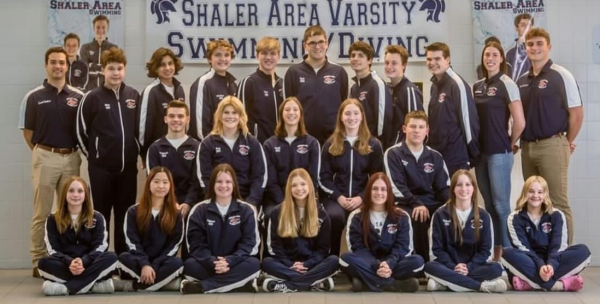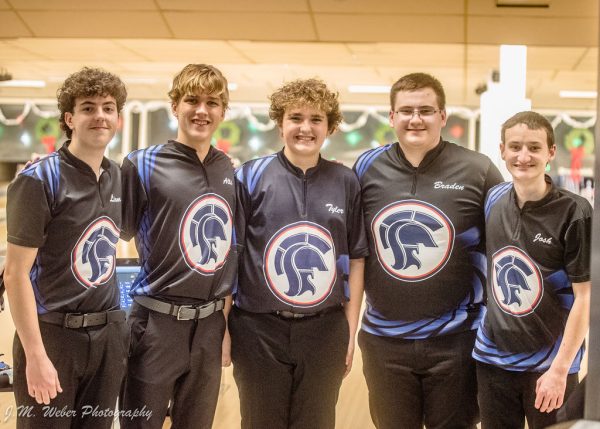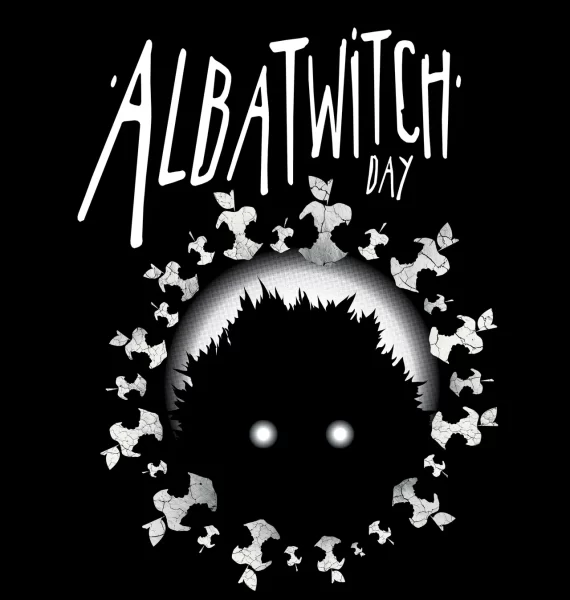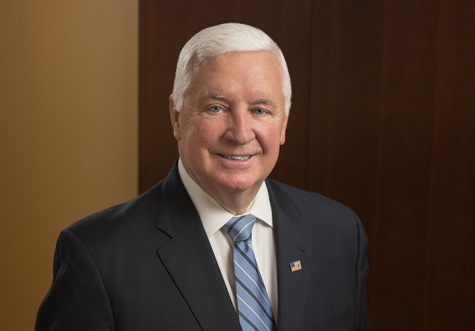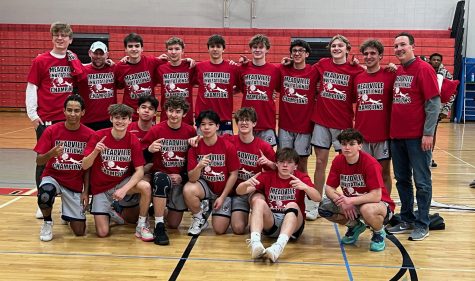1980 baseball — the greatest Shaler Area team
Pittsburgh Post Gazette file photo
The 1980 Shaler Area baseball team celebrates after a playoff game victory
The bus was unusually warm in the late afternoon of Tuesday, May 28, 2019. It was housing the Shaler Area boys baseball team, who had just come off an 8-1 clubbing of Laurel Highlands to capture the Class 5A WPIAL baseball championship, the first title won by the Titans in 20 years. Toward the front of the bus sat coach Brian Junker, who started getting motion sickness the more the bus rumbled on.
When his phone rang, Junker initially knew he would not feel like talking, but when he saw the caller ID, Junker realized that not answering was out of the question. He had to pick up.
Jerry Matulevic was on the line.
“Coach Matulevic was watching the game online and waited until he figured we were on the bus ride home,” Junker said. “He was very excited and proud of us. We normally talk about once a month so I wasn’t surprised by the call.”
Matulevic proceeded to congratulate Junker and his team on accomplishing something that hadn’t been achieved since Matulevic was the coach back in 1999: winning a WPIAL title.
That 1999 boys baseball team went 23-5, winning the WPIAL Championship game before losing the PIAA Championship game. It was Matulevic’s second-greatest squad that he coached, but it was his greatest team that helped put him and Shaler baseball on the map. The 1980 Shaler Area baseball team is the group that every Shaler Area baseball team since it has been compared to. It is the greatest team in Shaler Area history.
The Titans were loaded and would end up with six players going on to play professional sports (five baseball, one football). Wayne Shuckert (White Sox), Doug Maggio (Phillies), Rich Schlieper (Blue Jays), Matt Stennett (Astros), Chip Peluso (Royals) and Ken Karcher (Denver Broncos), who assistant coach Dave Fortun called the best athlete on the team.
Six more players went on to play NCAA Division I baseball (Kevin Walsh at Kent State, Eddie Bodnar at Pitt, Tim Kotkiewicz at Yale, Tom Weider at Maryland and Rich Schlieper at WVU), with three players (Kotkiewicz, Stennett, and Karcher) playing NCAA Division I football.
Schukert and Maggio were both selected in the first nine rounds of the MLB Draft, and were set to sign with their pro teams once the Shaler season ended. They couldn’t wait to begin their Major League journeys, but had business to take care of in high school before they did.
One of the downsides of playing baseball in the late twentieth century is that facilities weren’t the best, and certainly weren’t what they are now.
“We didn’t have the fabulous fields or training facilities that are around today,” Miller recollected. “We would practice on the basketball gym floor until there was a day we could get outside. That meant it was above freezing and the parking lot was clear for us to field ground balls and fly balls. On game days, we had a tool shed in our locker room with rakes and brooms for us to get the field ready. There was also a local lumber yard that would save sawdust for us to use after it rained. I guess field dry wasn’t invented yet.”
Despite the poor facilities and maintenance work that needed done, Shaler was presenting perhaps the best team in the state that year, and went into the season with championship aspirations.
For a group that has been heralded as “the greatest WPIAL team ever”, the 1980 Titan baseball season did not start out as planned.
Shaler began that year’s campaign with a 5-3 record, and it appeared a team that headed into that season with championship hopes might not even make the postseason.
“We started okay,” remembers Fortun, “but then got hot.”
“Shaler was known for many years to be one of the best-run baseball programs in western Pennsylvania,” John Miller, one of the members of the team, said. “We weren’t cocky, but we did feel that our team was going to carry on the tradition.”
After losing three of their first eight games, the Titans would go on to win every single game the rest of the season. Shaler went 25-0 following their 5-3 start, and finished the season with a 30-3 record. They outscored opponents 218-53.
“As players, we didn’t look forward in the schedule (one game at a time),” Miller said. “We played the other team as best we could. If there was foresight in our future opponents, that was the coach’s decision to have us ready. What made it so impressive was the fact that our opponents always put their best pitcher on the mound to face us.”
So the Titans entered the postseason following maybe their best regular season in program history, and ready to win their first WPIAL championship in 16 years and their first state title ever.
For the first and only time in PIAA history, the baseball playoffs in 1980 followed the college football format.
That year, 16 teams went to Shippensburg University on a Sunday and competed in what was a double-elimination format. Teams were eliminated when they suffered their second defeat, meaning as long as you won, you kept playing. You had five days to get five victories, and if you did you were PIAA state champs.
“When the playoffs came around, we knew we had something special going on and we just kept rolling along,” Miller recalled. “Pitching, hitting and defense were exceptional.”
During the WPIAL playoffs, Shaler cruised, beating their three opponents by a combined score of 26-1 to win the 1980 WPIAL championship.
During the PIAA tournament, the Titans stayed in Shippensburg University dorms, but they played more like a professional baseball team than a college squad.
Shaler began its state championship quest against Bedford, and made quick work of the Bisons in a 16-0 rout. Pennsbury was next, and suffered the same fate with an 8-4 loss to the WPIAL champs.
The third game of the tournament turned out to be the toughest, with the Titans scheduled to face the reigning PIAA state champions State College.
The Titans started slowly, and found themselves in an early 2-0 hole. They came back to lead by a run in the sixth inning, but State College tied the game 3-3. In the bottom of the seventh, the final inning unless the game remained tied and headed to extras, Maggio got a sacrifice fly allowing a run to score and the Titans to win 4-3, dethroning the reigning state champs.
“Each game was planned out to perfection by our coaches,” Miller said. “Even though that was our closest game, we still expected to win.”
Miller expanded on that thought and mentioned how crucial the coaching staff was that year to the team’s success.
“We had the best coaching staff,” Miller declared. “[Coach Matulevic] and [Coach Fortun] taught us more than just baseball strategy. They taught us that talent can only take you so far. Teamwork, discipline and preparation are the skills that will help you succeed in life. Work hard for what you want. Sacrifice individual needs for the team.”
The next day’s matchup wasn’t as challenging with Shaler scoring nine runs against Whitehall and winning by three. The Shaler Area Titans were headed to the PIAA State Championship game.
The matchup was to be held at Fairchild Field, one of the ballparks at Shippensburg University. An oddity of the park was that it did not feature an outfield wall in right field, and what stood was an ivy-covered hill deep beyond the outfield boundary. What happened if a ball wound up lost in the ivy? Would it be considered a ground-rule double or a home run?
Hours before the game was set to begin, Coach Matulevic was talking to the umpires and asked what would happen if that scenario took place.
The umpires calmly told Matulevic not to worry because balls never ended up in the ivy. It was too far away and the hill wouldn’t come into play.
The Titans were playing Coughlin, who did not score in the top of the first. Batting for the first time, Shaler’s leadoff hitter stepped up to the plate and launched a ball deep into right field, over the outfielder’s head, into the ivy. Coughlin’s right fielder couldn’t find the ball, and without a rule on what to do in this situation, Shaler’s leadoff hitter made his way around the diamond and scored to put the Titans on top 1-0.
Perhaps it was meant-to-be, perhaps it was luck, or maybe the 1980 Titans were just that good. Whatever the case, it carried Shaler through the rest of the game and to a 5-2 victory, giving the Titans their first state championship.
The Titans closed out the PIAA tournament outscoring their opponents 42-15, and won all their playoff games in 1980 by a combined score of 68-16.
“We never lost [in the PIAA tournament], stayed in the winner’s bracket and had to only play once a day,” Fortun remembers. “Other teams ran out of pitching, playing multiple games, but we did not.”
Because of the date the championship game was scheduled for, the seniors on the team missed graduation night. Their commencement ceremony was missed, but they gifted the district with their most storied sports season. As Fortun noted, missing the event was “a small price to pay” for a PIAA championship.
“Our seniors were a dedicated bunch of ball players,” Miller said. “I don’t think any of them even thought about missing graduation.”
Following their magical 1980 season, Shaler went 29-2 in 1981 and would repeat as WPIAL champs behind many of the players from the previous year.
In 2002, the 1980 Shaler baseball team was inducted into the Shaler Area Athletic Hall of Fame in the Hall’s second year of existence. “The 1980 Shaler Area Varsity Baseball Team was perhaps the most dominating baseball team in the history of Shaler Area,” read part of the team’s bio. Six years later, the bunch was inducted into the WPIAL Hall of Fame.
“It was a great accomplishment for our team, the school and the many loyal fans that cheered us on throughout the season [to be inducted into the Hall of Fames],” Miller said. “It’s nice to know that that special season will always be remembered.”
To this day, the 1980 team is still discussed around Shaler’s baseball program, and Junker will mention that year’s group from time to time.
“We bring up the ‘80 state team all the time,” Junker said. “Tom Gralewski was very close in age with all of those players and I was with Jerry Matulevic for 25 years (ten as a player/camper and 15 coaching at his camp). So we have heard all of their stories and we share thoughts about that team often. In my opinion it helps to keep a strong culture of hard work and discipline on and off the field. Which in turn brings lots of wins. Naturally our goal is to join that ‘80 team with a state championship of our own.”
Outside of the Shaler baseball team itself, Matulevic’s 1980 group is one that resonates throughout the district.
“The 1980 Shaler baseball team was a team that would not be denied,” Miller said. “We were a team that was prepared for anything. A team that didn’t make mental mistakes. Whatever it took, we got the job done by the end of the game.”
Matulevic would go on to be inducted into the Western Pennsylvania Hall of Fame and the Pitt Sports Hall of Fame, and has been the recipient of two Commonwealth of Pennsylvania House of Representatives Citations for Baseball Coaching Excellence. He has also been recognized in the Pennsylvania High School Sports Record Book of Excellence in Coaching. Shaler Area’s baseball field, Matulevic Field, bears his name.
“Matulveic was one of the greatest coaches in WPIAL baseball history … You could make an argument for his 1980 team being the best in WPIAL history,” stated a 2019 Pittsburgh Post-Gazette article.
Forty-two years removed, that sentiment still holds true, just as the memories from that year, passed on by players and coaches through the generations. Through all of them, the fable will continue to grow — almost like ivy.

Dominic DiTommaso is an award-winning sports writer and columnist for The Oracle at Shaler Area High School. He first started writing sports columns for...


